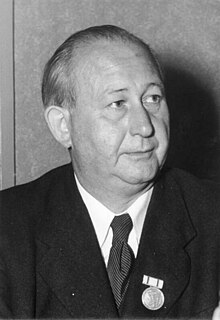- ↑ "Fechner, Max: * 27.7.1892, † 13.9.1973 Minister für Justiz". Bundesstiftung zur Aufarbeitung der SED-Diktatur: Biographische Datenbanken. Retrieved 27 October 2014.
- ↑ Gedenkstätte Berlin-Hohenschönhausen:Biografie Fechners Archived 27 October 2014 at the Wayback Machine
Max Fechner | |
|---|---|
 Fechner in 1952 | |
| Minister of Justice of the German Democratic Republic | |
| In office 1949–1953 |